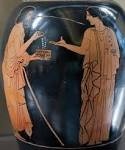Posts by Alan Sommerstein
Parallel but presumably unconnected
September 27, 2013
In 2007 Christoph Muelke published a small papyrus fragment (Oxyrhynchus Papyrus 4807) containing about a dozen lines of verse, which happened to include six words that had been quoted by an ancient commentator on Aristophanes who attributed them to Sophocles. The context of those six words had not been known, but the new fragment surprisingly …
Aeschylus’ ghost writer?
September 20, 2013
We are familiar today with the phenomenon whereby new novels are published in the style of, or as sequels to, the work of popular or classic authors, most recently in the case of Agatha Christie. This of course is done quite openly, and everybody knows that it’s not actually an undiscovered work of the great …
Disguise and change of clothing
September 13, 2013
In the snows of mid-January this year, I was in Amsterdam for the silver jubilee celebrations of the university’s student classical society, and gave a talk on “Disguise and change of clothes in Aristophanic comedy”. As I am not intending to publish this in the ordinary way, I have posted it here for blog browsers …
Two upcoming talks …
September 4, 2013
… organized by Nottingham’s Classics Research Workshop in conjunction with the Centre for Ancient Drama and its Reception (CADRE). Both will be held on Tuesdays at 5 pm in room A3 (unless otherwise notified – any change will be posted on this blog), Humanities Building, University of Nottingham. October 8 – Johanna Hanink (Brown University) …
Very Brief Comic Quiz – the answer
August 16, 2013
Of the six assorted celebrities named in my Very Brief Comic Quiz three weeks ago, the one who won’t have an entry in the Encyclopedia of Greek Comedy is William Shakespeare. There is no good evidence that Shakespeare ever had any direct contact with Greek comedy, though he was certainly familiar with Roman comedy (in …
Very brief comic quiz
July 26, 2013
Having been appointed editor of the Wiley-Blackwell Encyclopedia of Greek Comedy, I have been drawing up the list of entries. Which one of the following is NOT going to have an entry? Claudius (Roman emperor) Niccolò Machiavelli Pablo Picasso Franz Schubert William Shakespeare Mikis Theodorakis The answer will be given when this blog comes back …
The Dionysia Drama Contest
July 16, 2013
In the many national and international competitions for literary and artistic prizes, there are two basic methods of determining the result. The most common, perhaps, is to choose a panel of judges (generally composed of professional experts), let them deliberate behind closed doors, and wait for a verdict which all the members of the panel …
Sophocles the politician
July 5, 2013
Sophocles was arguably the greatest, and certainly in his own time the most popular, of Greek tragic dramatists. He was also, in his later years, a prominent figure in Athenian public life, and one whose relationship to Athens’ democratic political system was curiously equivocal. He was more than once chosen by popular vote for the …
The Oresteia explained
June 25, 2013
Steven Pinker, the linguist, cognitive scientist and author of half a dozen must-read books (including How the Mind Works, The Stuff of Thought, The Blank Slate and The Better Angels of our Nature), wrote in his 2007 article “A history of violence” : “Life in a state of nature is nasty, brutish, and short, not …
Menander in Contexts
June 17, 2013
Fifteen of the papers from last year’s Nottingham conference on Menander in Contexts, byscholars from seven countries, are due to be published by Routledge in January 2014 as a book with the same title. It is over a century since Menander made his first great step back from the shades with the publication of the Cairo codex, and …


